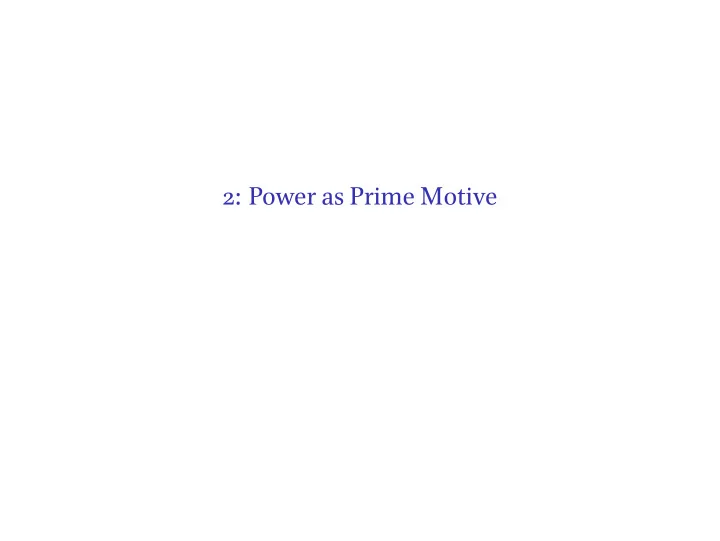

2: Power as Prime Motive
Moral Relativism 2. Meta-ethical: A moral judgement can only be assessed for validity within its own culture; no one (system of) value(s) is universally more valid than any other. 3. Normative: Given (2), we cannot impose moral norms universally. Logical obstacle to (2): It is self-defeating.* Logical obstacle to (3): It relies on (2); also, the assertion “we should not/must not/ought not to impose moral norms universally” is self-defeating.* * Provided these propositions are of the same category as those over which they make assertions. 1. Descriptive: Different cultures have (greatly) different value systems.
Moral Relativism 2. Meta-ethical: A moral judgement can only be assessed for validity within its own culture; no one (system of) value(s) is universally more valid than any other. 3. Normative: Given (2), we cannot impose moral norms universally. Logical obstacle to (2): It is self-defeating.* Logical obstacle to (3): It relies on (2); also, the assertion “we should not/must not/ought not to impose moral norms universally” is self-defeating.* * Provided these propositions are of the same category as those over which they make assertions. 1. Descriptive: Different cultures have (greatly) different value systems.
Moral Absolutism The meta-ethical position that at least some actions are inherently right or wrong, irrespective of circumstances. Deontology The meta-ethical position that actions derive their moral value from rules and duties rather than concrete circumstances. principle you would approve as a universal law. Moral absolutism and deontology are differently construed opposites of consequentialism (see below). Notably Kant’s categorical imperative: do only that of whose governing
Consequentialism The position that the consequences of an action determine its moral value. The opposite of moral absolutism and deontology. Utilitarianism A consequentialist position asserting that one ought to strive for the greatest happiness for the greatest number.
Divine Command Theory The meta-ethical position that the moral value of an action is determined by divine revelation.
The Prince ch. 3: Repression “ In this regard it’s worth noting that in general you must either pamper people or destroy them; harm them just a little and they’ll hit back; harm them seriously and they won’t be able to. So if you’re going to do people harm, make sure you needn’t worry about their reaction. (Parks, The Prince , 10) ”
The Prince ch. 8: Cruelty “ I think it’s a question of whether cruelty is well or badly used. Cruelty well used (if we can ever speak well of something bad) is short-lived and decisive, no more than is necessary to secure your position and then stop; you don’t go on being cruel but use the power it has given you to deliver maximum benefits to your subjects. Cruelty is badly used when you’re not drastic enough at the beginning but grow increasingly cruel later on, rather than easing off. A leader who takes the first approach has a chance, like Agathocles, of improving his position with his subjects and with God too; go the other way around and you have no chance at all. (Parks, The Prince , 36) ”
The Prince ch. 18: Deceit Figure: Prisoner’s Dilemma matrix (CC-BY-SA C. X. J. Jensen & G. Riestenberg)
A Meta-Strategy for the Prisoner’s Dilemma Figure: Golden Balls (YouTube link)
Debate “ A country should only engage in war if its own territory is under active attack ” “ It is sometimes necessary to attack another country or militia when one’s own territory is not under active attack ” “ Economic interest is sufficient reason for attacking other countries without provocation ”
Bibliography Parks, Tim, trans. Niccolò Machiavelli: The Prince . Penguin, 2009. P. S. Langeslag
Recommend
More recommend